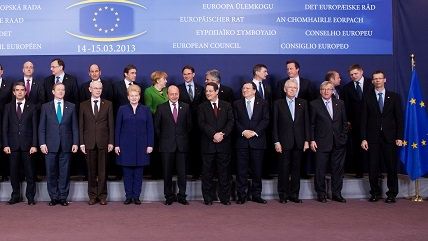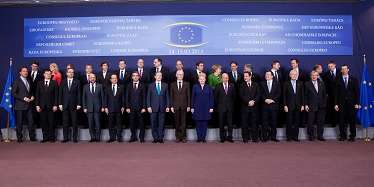This One Neat Accounting Trick by the EU is Costing Its Members Billions!


The European Union boasts that 99 percent of its budget comes from the EU's "own resources," which include customs duties, the value added tax, and a tax on gross national income. That last one is meant "to fund the part of the budget not covered by other sources of income." Unsurprisingly, the EU explains that while "designed simply as a balancing system, this has become the largest source of revenue." It was 92.8 billion Euros in 2010, the latest number given in the EU's explainer.
Every year that "balancing system" means the 28 countries that make up the EU get a bill for payment. Some get rebates. The bill is based on the governments' reporting of gross national income. The EU also "adjusts" how much countries owe, and this year based the adjustment on what it insisted was a "once in a generation review" of how national incomes are calculated. That led to the EU billing the United Kingdom an additional 2.1 billion euros on top of its 10.9 billion euro payment. It demands the money by December 1.
David Cameron, the prime minister of the UK, says his country's not paying the bill. Reuters reports:
He found some sympathy - a visibly furious Cameron told a news conference that Italian Prime Minister Matteo Renzi had also lambasted "bureaucrats without a heart", who made it harder to persuade citizens of the Union's value.
"It's an appalling way to behave," Cameron said. "I'm not paying that bill on Dec. 1. If people think I am they've got another thing coming. It is not going to happen."
EU ministers will hold an emergency meeting on the issue next month. Cameron said he wanted to understand the technical calculations and was also ready to mount a legal challenge.
"Wanting to understand" seems like a convenient way to leave the door open to eventually paying the bill. There's a by-election on November 20, where a Conservative member of Parliament who resigned is running to retake his seat with the UK Independence Party. UKIP's leader, Nigel Farage, called the EU a "thirsty vampire" looking for taxpayer blood. All of Parliament goes up for elections next May. Cameron promises a referendum on EU membership in 2017, if he's re-elected.
Italy sympathizes because it, too, now owes the EU more money, as does Greece. France and Germany, meanwhile, are getting rebates, according to Reuters. While Germany's Angela Merkel said she felt Cameron's pain, other European leaders dismiss Cameron's states refusal to pay. "I think it's very important that we don't start treating the EU as some sort of a simplified accounting exercise," Reuters quotes the Finnish prime minister, Alexander Stubb as saying.
Yet an "accounting exercise" seems like exactly what the "adjustment" (which the EU says is conducted by civil servants) is. By the EU's own description, the annual payments made by EU members was supposed to "simply" be a "balancing system." It's now the EU's largest source of revenue. If anyone's turned the EU into a simplified accounting exercise, it would seem to be the Eurocrats.


Show Comments (59)